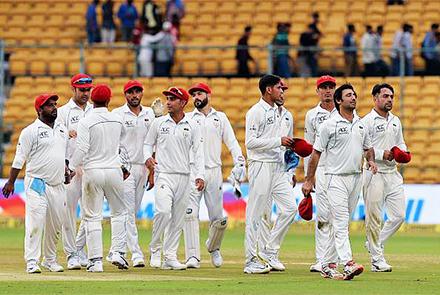Afghanistan’s historic first Test lasted all of two days. But each of those six sessions were a celebration of cricket.
India were ruthless in their innings and 262-run win on Friday, in Bengaluru, their approach befitting their status as the No.1 team. But this was a Test played in the best of spirits throughout – in the spirit of friendship.
The final Afghanistan wicket to fall, just two minutes before play was officially scheduled to end, saw handshakes and hugs exchanged between the teams. As teammates and friends from the IPL, there was visible respect for the hard work that had gone in on either side.
The final moment, in a game full of special moments right from the time those red caps were handed out, saw both teams come together for a photograph.
As Ajinkya Rahane, the India captain, put it, there are things beyond winning and losing.
“I have always believed winning and losing is part and parcel [of the game],” he said. “Your effort, attitude and intention should always be about winning, but you get to learn plenty off the field as players, like respecting each other.
“We learnt a lot [by playing Afghanistan]. Apart from that we got to see good relationships, their players were asking Indian players … the willingness to learn could be seen, they wanted to know what they need to learn to do well in Tests.
“Winning and losing is not the only important thing, what you learn on and off the field is very important.”
Afghanistan's captain Asghar Stanikzai was disappointed at the result, but said lots of lessons will be learnt from a difficult debut and thanked the fans for their support.
Phil Simmons, the Afghanistan coach, agreed there was an “air of disappointment” at how the team collapsed twice in two sessions, but said the learning from the experience was huge. Playing their first Test against lower-ranked sides might have flattered the scoreline, but this was an important lesson, he said.
“It may have been more competitive but you wouldn’t have learned as much as you did from this game because when you play against the best you will know how much you have to do to get where they are.
“That’s what I will take away from this game, players see that now and it’s not just telling them how tough Test cricket is.”
There was consensus across the board that this Test should be the platform from which the newest Test nation strides forward, to add more chapters to its already incredible rise in world cricket.
Rahane, for one, insisted this was “just the beginning” for them. More Tests, more first-class games and practice with the red-ball would help them improve, he said.
“With their bowling, they can do a bit of damage to any other team. The more they play any opponent, they will learn from them. They tried their best. After the first innings, [you could see their openers] were trying to stay on the wicket.
“But it’s still a beginning. It’s just about playing those matches, five-day cricket regularly ... creating those situations in practice also and thinking and visualizing as batsmen how they are going to play against each opponent.
Playing more red-ball cricket at the international and domestic level can only help Afghanistan Playing more red-ball cricket at the international and domestic level can only help Afghanistan
“Test cricket is lot about attitude and patience and with that bowling they can damage any team. If two or three guys can bat for a longer period of time, they can be a decent Test side.”
Simmons, who had hailed the country's talent at grassroots-level before the match, hoped the youngsters had opportunities to play ‘A’ games in different conditions around the world.
“There has to be a lot more ‘A’-team cricket played against big countries by some players – players just below 18 – in England, India, Bangladesh, Australia… That’s the best way for us to close this gap.
“Their learning curve is huge. [But] I do believe they want to succeed, they want to be good at it and they work very hard and we now know that we have to work five times as hard as we did in the last four games. I believe that they will get there.”

